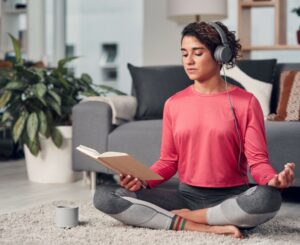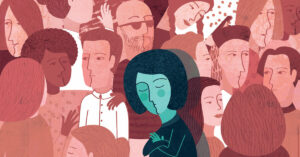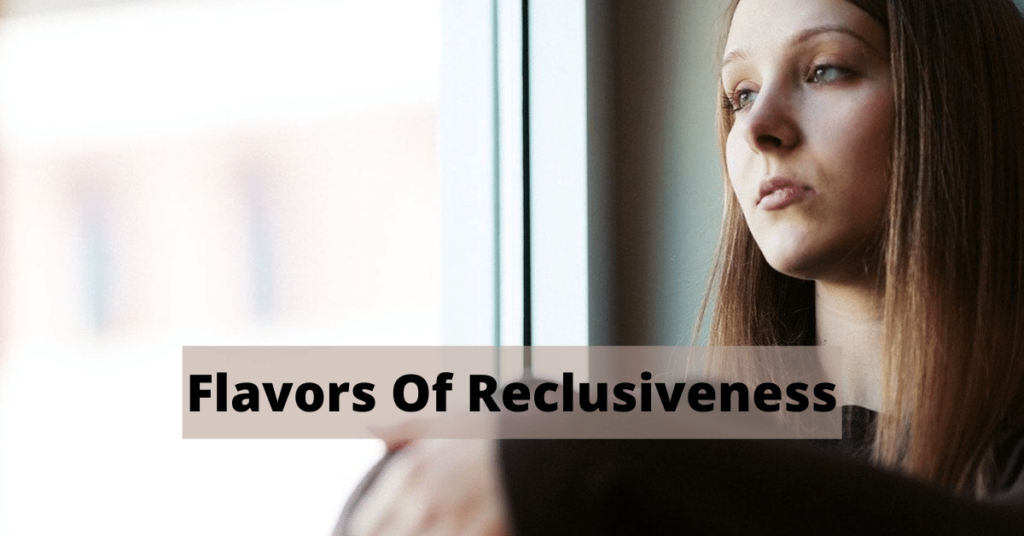Individuals are more likely to gravitate toward their own personal flavors of reclusiveness. Some people crave the company of others, while some find themselves retreating from society altogether. Regardless of your preference, it’s crucial to remember how to keep yourself safe and healthy in order to be able to connect with other people on a deeper level.
Contents
What Is Reclusiveness?
 Reclusiveness is the condition of being solitary. It is not just an emotional state but it can also be a physical state where people are not able to get out of their homes. People who are reclusive may have various symptoms, some of which include heart disease, depression, or high blood pressure. These symptoms are also related to personality, culture, and psychiatric issues. For instance, Asian cultures have a lower rate of reclusiveness because they seek help from family members when dealing with problems. However, Western cultures have a higher rate of reclusiveness because people are more independent and less communicative.
Reclusiveness is the condition of being solitary. It is not just an emotional state but it can also be a physical state where people are not able to get out of their homes. People who are reclusive may have various symptoms, some of which include heart disease, depression, or high blood pressure. These symptoms are also related to personality, culture, and psychiatric issues. For instance, Asian cultures have a lower rate of reclusiveness because they seek help from family members when dealing with problems. However, Western cultures have a higher rate of reclusiveness because people are more independent and less communicative.
Flavors Of Reclusiveness
 Some of the options that even social people want to consider. Here are some flavors of inclusiveness, you may want to try-
Some of the options that even social people want to consider. Here are some flavors of inclusiveness, you may want to try-
Pure recluses– They always want to be alone and do not like to be around
people.
Shy recluses– They don’t talk much but still feel comfortable when in a relationship with introverts and extroverts: If they are in an environment with strangers, they become uncomfortable or worried.
Wary recluses– These people are suspicious of others and do not trust them. They can sometimes be described as “lurking” online because they are observing but not talking. Wary recluses are skittish in new social settings and feel anxious when meeting new people.
Restrained recluses- These people are mostly happy staying at home and socializing with family members or friends they already know well. They still go out to public places but prefer to only interact with the close ones they know well. Over time, though, this may change as they feel more comfortable talking to other people in public.
Anxious recluses– These people feel overwhelmed when they are in a social situation, which can lead to them feeling extremely uncomfortable and anxious. They do not understand why they feel this way because they want to be able to comfortably join in conversations with others, but their anxiety prevents them from doing so.
Restrained vs Restricted Recluses
Restricted recluses have a narrower range of activities that they are willing to do. This may involve staying inside all the time, talking only to a certain group of people, or avoiding social media altogether. Restricted recluses generally don’t have a problem with being around people, but they have specific limitations on what they are willing to do.
Extroverts need alone time, too. Now that we have a better understanding of the different flavors of reclusiveness, it is important to remember that extroverts also need some time alone. Just because someone is an extrovert does not mean they want to be around people all the time. Extroverts need time to recharge and relax, just like introverts. So, if you are an extrovert, don’t feel guilty for needing some time alone. Just make sure to schedule it so that your loved ones know that you will be unavailable during that time.
Symptoms Of Reclusivity

Reclusiveness is a lifestyle that some people will choose consciously or unconsciously because of social anxiety. Social anxiety prevails when a person feels the need to retreat from social interactions for fear of being judged, rejected, embarrassed, or ridiculed.
Earlier in the article, it states that reclusiveness can be a sign of depression as well as other things. The symptoms can be easier to diagnose if you know what to look for. Some symptoms may include:
- Inability to take care of oneself
- Inability to control emotions-upset from rejection from friends and family, and more
- Broken relationships with loved ones and friends
- Feelings of shame and guilt over past actions
- Troubling thoughts and feelings that persistently intrude on daily life
- Withdrawing from usual activities and social interactions
People who are reclusive usually have one to three symptoms that can include:
- Social withdrawal -Difficulty expressing emotions or affection for other people -Lack of motivation to find social activities
- Preoccupation with thoughts and worries
- Low self-esteem
- Anxiety or panic attacks
Ways To Cope With Symptoms Of Reclusiveness
If you are experiencing any of the symptoms of reclusiveness, there are a few ways that you can cope. Here are some tips:
1. Get A Hobby
 People who are reclusive may find themselves excessively dwelling on their thoughts to the point where they have no motivation to do anything else. Having an enjoyable hobby can help people get out of their heads and create positive feelings in order to motivate them to accomplish tasks. Here are some ideas for possible hobbies:
People who are reclusive may find themselves excessively dwelling on their thoughts to the point where they have no motivation to do anything else. Having an enjoyable hobby can help people get out of their heads and create positive feelings in order to motivate them to accomplish tasks. Here are some ideas for possible hobbies:
-Writing -Photography -Drawing or painting -Building something
2. Take Good Care Of Your Body
It’s important to eat healthy foods, exercise regularly, and sleep 8 hours a night. These are all ways that people can improve their physical health because being physically active improves one’s mood as well as heart rate. Additionally, getting a good night’s sleep helps improve focus and concentration.
3. Connect With People Digitally
There are many ways to connect with other people online whether it be through social media, forums, or blogs. This is a great way to stay connected to the world without having to leave your home. You can also participate in online activities that you enjoy like contests, giveaways, and memes.
4. Reach Out To Family
Many people who are reclusive do not have someone they can confide in. This is why it is important to reach out to family members or close friends so that you can alleviate your anxiety or any other symptoms you may be experiencing. Here are some tips for reaching out to people:
-Use social media -Send an email, text message, or message them on Facebook or Twitter -Call them using Skype or FaceTime
5. Seek Professional Help
 People who feel unhappy with their lives are likely to be reclusive; however, there could be other underlying issues that make you turn to reclusiveness. Severe cases of reclusiveness can be signs of depression so it is important to seek professional help if you are feeling this way.
People who feel unhappy with their lives are likely to be reclusive; however, there could be other underlying issues that make you turn to reclusiveness. Severe cases of reclusiveness can be signs of depression so it is important to seek professional help if you are feeling this way.
There is no one-size-fits-all solution for reclusiveness so it is important to try different things until you find something that works for you! What helps one person may not work for someone else so be patient and keep exploring your options. Stay strong and remember that there is always a light at the end of the tunnel!
Tips For Those Who Enjoy Spending Time Alone
If you enjoy spending time alone, it can also be difficult to cope with social withdrawal, low self-esteem, or an anxiety attack; however, there are some coping strategies that may be effective for you.
Here are some tips that may help:
1. Join A Meetup Group
There are many meetup groups in your area that cater to different interests. Joining one of these groups will provide you with social interaction and make it easier to make new friends. You can even find groups online on websites like Meetup.com! If finding a meetup group is not possible, joining a chat room could also help you connect with people who share the same interests as you.
2. Get Involved In Online Activities
There are many online activities that you can participate in to connect with people from all over the world. Some examples include joining a forum, blog commenting, or social media. This is a great way to connect with people on a deeper level without having to leave your house!
3. Make Plans For Future Events
When you know that you have something fun planned in the future, it’s easier to keep yourself motivated and out of reclusion mode. There is excitement and anticipation surrounding the event so try setting some goals and working towards them so you can look forward to the event!
4. Seek Professional Help
People who enjoy spending time alone can also feel anxious, lonely, or depressed; however, there is no shame in asking for help to improve your quality of life. Remember that there is nothing wrong with seeking professional help for your mental health so don’t be afraid to ask for it! It could really make a world of difference in your life.
5. Take Care Of Yourself
 It is important to take care of yourself when you are feeling reclusive. This means taking time for yourself to relax and do the things that make you happy. Some self-care activities include reading, listening to music, painting, or writing. Taking care of yourself will help improve your mood and make it easier to socialize when you feel up for it.
It is important to take care of yourself when you are feeling reclusive. This means taking time for yourself to relax and do the things that make you happy. Some self-care activities include reading, listening to music, painting, or writing. Taking care of yourself will help improve your mood and make it easier to socialize when you feel up for it.
There is no one-size-fits-all solution for reclusiveness so it is important to try different things until you find something that works for you! What helps one person may not work for someone else so be patient and keep exploring your options. Stay strong and remember that there is always a light at the end of the tunnel!
Causes Of Reclusiveness
There are many reasons why a person would feel the need to withdraw from society. It could be due to a traumatic experience, such as abuse or a death in the family. It could also be due to an illness, such as depression, bipolar disorder, or schizophrenia. Some people may also be reclusive because of social anxiety.
Social anxiety is the fear of being judged, rejected, embarrassed, or ridiculed by others. This fear can be so great that it causes a person to avoid social interactions altogether. People with social anxiety often have low self-esteem and feel as though they are not good enough.
The article also states that reclusiveness could be a sign of other mental health issues, such as depression, bipolar disorder, and schizophrenia. If you are experiencing any of the symptoms listed above, it is important to seek help from a professional. These are serious mental health issues that should not be taken lightly. Treatment is available and can help improve your quality of life.
Treatment For Reclusiveness

There is no one-size-fits-all solution for reclusiveness, so it is important to try different things until you find something that works for you. What helps one person may not work for someone else so be patient and keep exploring your options. Remember that there is nothing wrong with seeking professional help for your mental health and no one should be ashamed of asking for it.
Reclusiveness can be a symptom of social anxiety, which is the fear of being judged, rejected, embarrassed, or ridiculed by others. Social anxiety can cause a person to avoid social interactions altogether. People with social anxiety often have low self-esteem and feel as though they are not good enough.
There are many treatments available for social anxiety. Some of these treatments include:
Therapy
Therapy is a great option for people with reclusiveness. It can help you explore the reasons why you are withdrawing from society and help you find ways to cope with them.
Medication
Medication may also be helpful in treating reclusiveness. There are many medications available that can treat different mental health issues.
Self-help groups
Self-help groups are a great option for people who want to learn how to cope with their mental health issues. These groups offer support and guidance from people who have been through similar experiences.
Cognitive-behavioral therapy (CBT)
Cognitive-behavioral therapy (CBT) is a type of therapy that helps you change the way you think about things. CBT can help you deal with the thoughts and feelings that lead to your reclusiveness.
Mindfulness
Mindfulness is a type of therapy that focuses on living in the present and accepting things as they are. This has been shown to be effective at treating anxiety, depression, and even schizophrenia. It can also help with reclusiveness because it helps you focus on the way you feel rather than what you think.
If you are experiencing reclusiveness, it is important to seek help from a professional. Reclusiveness can be a sign of other mental health issues, such as depression, bipolar disorder, and schizophrenia. These are serious mental health issues that should not be taken lightly. Treatment is available and can help improve your quality of life.
Conclusion
The article has been a great primer on the different flavors of reclusiveness. We hope you’ve learned about introverts and extroverts, as well as how to balance time with each personality type for optimal wellness. Next week we will be talking more in-depth about that balancing act: How do you successfully manage your relationships when one person is an introvert while the other is an extrovert? Until then, let us know what flavors of reclusiveness most resonates with you.
If you are looking for affordable Online Counseling MantraCare can help: Book a trial therapy session


